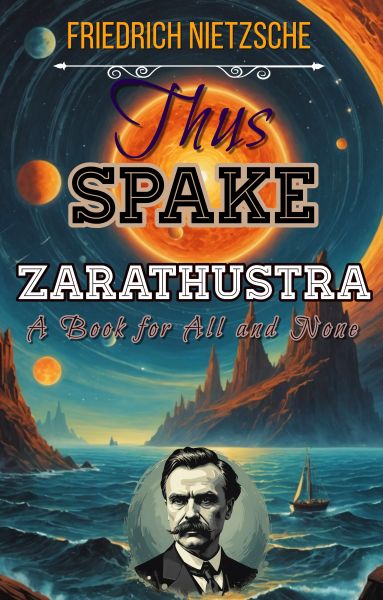Thus Spake Zarathustra
"A Book for All and None"
Thus Spoke Zarathustra: A Book for All and None (German: Also sprach Zarathustra: Ein Buch fur Alle und Keinen, also translated as Thus Spake Zarathustra) is a philosophical novel by German philosopher Friedrich Nietzsche, composed in four parts between 1883 and 1885 and published between 1883 and 1891. Much of the work deals with ideas such as the "Eternal Recurrence of the Same", the parable on the "Death of God", and the "Prophecy" of the Ubermensch, which were first introduced in The Gay Science.
Described by Nietzsche himself as "The Deepest Ever Written", the book is a dense and esoteric treatise on philosophy and morality, featuring as protagonist a fictionalized Zarathustra. A central irony of the text is that the style of the Bible is used by Nietzsche to present ideas of his which fundamentally oppose Judaeo-Christian morality and tradition.
Thus Spoke Zarathustra was conceived while Nietzsche was writing The Gay Science; he made a small note, reading "6,000 feet beyond man and time," as evidence of this. More specifically, this note related to the concept of the eternal recurrence, which is, by Nietzsche's admission, the central idea of Zarathustra; this idea occurred to him by a "Pyramidal Block of Stone" on the shores of Lake Silvaplana in the Upper Engadine, a high alpine region whose valley floor is at 6,000 feet (1,800 m). Nietzsche planned to write the book in three parts over several years. He wrote that the ideas for Zarathustra first came to him while walking on two roads surrounding Rapallo, according to Elisabeth Forster.
Friedrich Wilhelm Nietzsche] (15 October 1844 25 August 1900) was a German classical scholar, philosopher, and critic of culture, who became one of the most influential of all modern thinkers. He began his career as a classical philologist before turning to philosophy. He became the youngest person to hold the Chair of Classical Philology at the University of Basel in Switzerland in 1869, at the age of 24, but resigned in 1879 due to health problems that plagued him most of his life; he completed much of his core writing in the following decade. In 1889, at age 44, he suffered a collapse and afterward a complete loss of his mental faculties, with paralysis and probably vascular dementia. He lived his remaining years in the care of his mother until her death in 1897, and then with his sister Elisabeth Förster-Nietzsche. Nietzsche died in 1900, after experiencing pneumonia and multiple strokes.
Versandkostenfreie Lieferung! (eBook-Download)
Als Sofort-Download verfügbar
- Artikel-Nr.: SW9786057876225110164
- Artikelnummer SW9786057876225110164
-
Autor
Friedrich Nietzsche, Friedrich Nietzsche
- Mit Thomas Common
- Wasserzeichen ja
- Verlag E-Kitap Projesi & Cheapest Books
- Seitenzahl 400
- Veröffentlichung 08.11.2024
- Barrierefreiheit
- ISBN 9786057876225
- Mit Thomas Common

